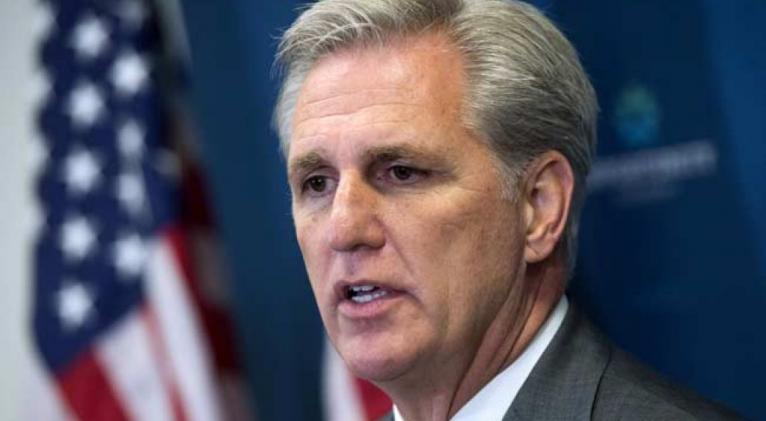Republican Chaos as Kevin McCarthy Quits US House Speaker Race
especiales

McCarthy, the party's number two in the House behind outgoing speaker John Boehner, appeared to have support from a majority of Republican lawmakers for the most important job in Congress - until his withdrawal from consideration.
The congenial 50-year-old Californian, who as majority leader has built connections among conservatives and moderates alike, fell victim to an intense revolt by the party's right flank as he sought the role that would have placed him immediately behind the vice president in the line of presidential succession.
"I'll stay on as majority leader. But the one thing I found in talking to everybody - if we are going to unite and be strong, we need a new face to help do that," McCarthy told reporters after announcing his decision at a party conference meeting.
House leadership postponed the party election, without giving a specific date.
Boehner had announced October 29 as the date for the full vote on the House floor to choose the new speaker, but McCarthy's withdrawal potentially puts that scheduling in doubt.
It also intensifies a battle for the direction of the Republican Party as its presidential candidates seek to reclaim the White House in 2016 after eight years under Democrat Barack Obama.
Seeking to calm the waters after McCarthy's exit, Boehner - who announced his resignation last month, effective at the end of October - issued a statement saying he would stay on "until the House votes to elect a new speaker."
"And I'm confident we will elect a new speaker in the coming weeks," he added.
Ahead of McCarthy's withdrawal, a group of about 40 hard-line conservatives known as the House Freedom Caucus had pledged to vote against him, raising the idea that he would be forced to offer them major concessions.
"He said he didn't think he is the right man to be the face of the party," said conservative congressman Walter Jones.
Lawmakers sounded unsure of what would happen next.
"I don't think the outcome is clear at all at this point," conservative congressman Trent Franks told reporters, adding that a caretaker speaker was a possibility.
Political earthquake
The Republican caucus has been bitterly divided, with staunch conservatives demanding a greater, grassroots say in the legislative process for rank-and-file members.
Little-known congressman Daniel Webster tapped into that frustration, announcing his candidacy for speaker earlier this month and saying he would work to bring a bottom-up style to leadership.
On Wednesday, he earned the endorsement of the Freedom Caucus.
"I will say Daniel Webster is the frontrunner, and who would have thought?" Freedom Caucus member Tim Huelskamp said.
Huelskamp, who has long sought Boehner's ouster, said the McCarthy bombshell was indicative of the way the party's establishment leadership has run the House.
"It's run with chaos, it's seat-of-the-pants, there's no long-term planning, there are no principles," he fumed.
'Utter chaos'
Moderates however were quick to blame uncompromising conservatives for the chaos.
"At some point we have to marginalize the rejectionist members of the conference," congressman Charlie Dent told reporters, saying it was important to nominate a Republican who "wouldn't make ridiculous concessions to the folks who don't want to govern."
House Ways and Means Committee chairman Paul Ryan, the Republican vice presidential nominee in 2012, has credibility among the establishment as well as rebellious conservatives.
But on Thursday, he reiterated he would not stand as a candidate.
"Kevin McCarthy is the best person to lead the House, and so I'm disappointed in this decision," he said.
"Now it is important that we, as a conference, take time to deliberate and seek new candidates for the speakership."
The McCarthy announcement hit Capitol Hill like an earthquake, prompting warnings from their Democratic rivals.
"The utter chaos of the Republican party must not threaten the full faith and credit of the United States and the American people," said Senate Democratic leader Harry Reid, referring to the looming debt ceiling battle.
Congress must raise the debt ceiling by November 5 or risk a credit default.
It also must craft a budget agreement before December 11 or face a government shutdown.
Dent said he was "reasonably confident" Congress can deal with the huge fiscal challenges in the near term, but admitted it would not be easy.
"Obviously this leadership turmoil isn't helping anything," Dent said.













Add new comment